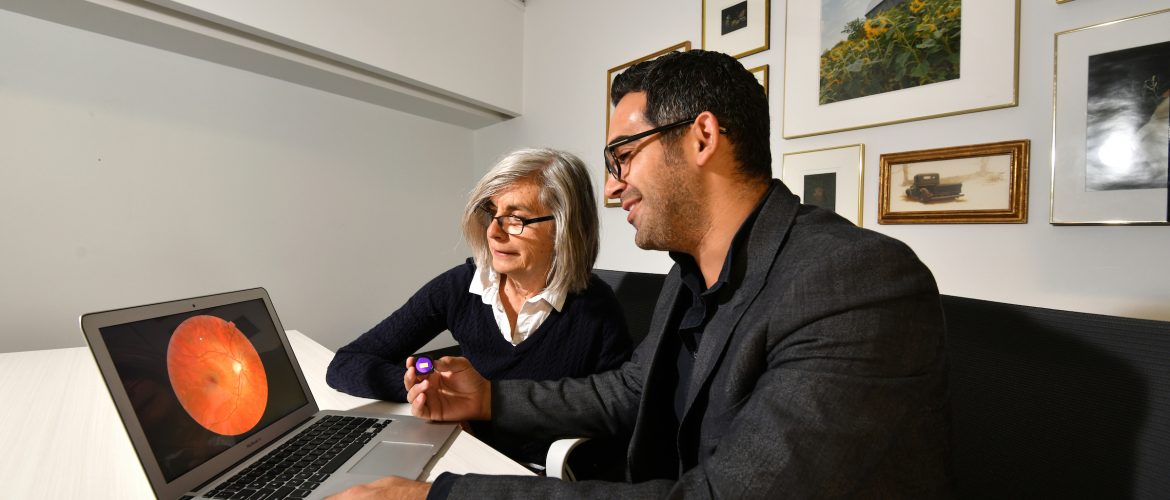An estimated 564,000 Canadians are currently living with dementia. As of 2016, the combined healthcare system and out-of-pocket caregiver costs each year related to Alzheimer’s are estimated at $10.4 billion per year. And by 2031, this figure is expected to increase by 60 percent, to $16.6 billion annually.[1]
Alzheimer’s is the most common form of dementia among the elderly – yet there’s no standard screening system for the disease. It’s difficult to diagnose Alzheimer’s early, which means treatment often occurs after the brain has suffered irreversible damage. Not only is this devastating for families, but as our population ages the heavy impact of Alzheimer’s on the healthcare system increases.
Ontario-based start-up RetiSpec is looking to change that.
Recent scientific evidence has demonstrated that the signs (or ‘biomarkers’) of Alzheimer’s normally found in the brain can also be found in the retina. What’s more, these biomarkers identify those at risk of developing the disease years before symptoms appear. RetiSpec has developed a non-invasive eye scanner that uses artificial intelligence to detect these biomarkers and identify people at risk of developing the disease. The technology is designed to connect to standard ophthalmological equipment that’s available at most clinics, making it accessible and easy to implement.
“Our goal is to identify the people that are at risk for Alzheimer’s so they can be treated at the right time, before it’s too late.”
“Current detection methods are expensive and invasive, and not suited to routine testing. Our goal is to identify the people that are at risk for Alzheimer’s so they can be treated at the right time, before it’s too late,” says Eliav Shaked, CEO of RetiSpec.
“It is crucial to understand that if you detect Alzheimer’s disease before signs of cognitive decline, it provides an important window of opportunity for timely therapeutic interventions, so the progression of the disease can be slowed or even prevented.”
The Centre for Aging + Brain Health Innovation (CABHI), powered by Baycrest, is working with RetiSpec to accelerate its technology in Ontario and Canada. Through the Industry Innovation Partnership Program, CABHI matched RetiSpec with the Toronto Memory Program, a medical facility with one of the largest clinical trial programs for Alzheimer’s in the country. The CABHI-funded RetiSpec trial will determine the safety and effectiveness of the technology through human clinical testing, and help spur commercialization of the technology in Ontario and Canada – to get it into the hands of those who need it most.
This article offers free shipping on qualified Face mask products, http://swisswatch.is/ replica watches or buy online and pick up in store today at Medical Department
“CABHI’s support has enabled us to do a lot more than we expected in a short time,” Shaked says. “It’s enabled us to move faster to market with this project that’s pivotal to our research and development, to our business development, and to our commercialization process.”
Though the company has global ties – RetiSpec is conducting a concurrent study with Israeli hospital Sheba Medical Center – Shaked says it was important to start local.
“Collaborating with CABHI is allowing us to immediately help Canadians in our own backyard. We’re doing a trial here in Ontario so we can get our technology Canada-approved and start adding value today.”
Most recently, in October 2019, RetiSpec received an award of up to $500,000 USD from the Alzheimer’s Drug Discovery Foundation (ADDF) Diagnostics Accelerator to further accelerate the commercialization of their technology. The accelerator is funded in part by Bill Gates and Jeff Bezos, among others.
Not only does the RetiSpec technology have the potential to drastically improve the lives of aging Canadians, it could decrease Alzheimer’s patients’ long-term medical needs – thereby saving the healthcare system money and resources. With CABHI’s support, RetiSpec is hopeful its technology will make a positive health and economic difference on people living with Alzheimer’s today.
[1] Alzheimer Society of Canada. “Dementia Numbers in Canada.” Alzheimer Society of Canada, 2019, alzheimer.ca/en/Home/About-dementia/What-is-dementia/Dementia-numbers.


